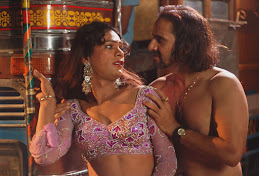
Telegraph (westside view), Kolkata July1, 2008
Interconnected stories of sexual minorities, born in a city that doesn’t have time to connect
The usual romances of Bollywood were turned on their head at a screening in Calcutta on Saturday — thanks in part to British funding. A new film, backed by the British Department for International Development (DFID), uses all the usual tropes of the Bollywood blockbuster: song, dance and close-up-spangled drama. But this time it is not a boy-meets-girl scenario. Here the lovers are transsexuals, bar dancers, prostitutes and a gay couple — and their tragedies are based on the real-life stories of those facing HIV in Mumbai.
68 Pages is directed by Sridhar Rangayan — who, I should declare, directed me in another gay film with British funding, Yours Emotionally!. But while Yours Emotionally! was in English and aimed primarily at an international film festival audience, 68 Pages is in Hindi and sloshing with plenty of Bolly thrills and spills. Sridhar has a different audience in mind.
“It is for a mainstream grassroots audience,” Sridhar tells me on the phone, after the Saturday screening. “We felt that we wanted to help change their way of looking at sexual minorities. DFID UK had a programme running in India which was doing advocacy work on HIV AIDS — and they wanted to do a film on the situation here.”
Looking at its assemblage of unusual characters — who are based on the stories of real-life friends of the Mumbai sexual health organisation, The Humsafar Trust — the film charts lives riddled with trauma, happiness and hope. It examines people who, stuck with HIV, are marginalised.
“This is a Bombay that we didn’t know of,” says Sridhar. “It’s the one we never stopped to think about it. It’s about interconnected stories of people in a city who don’t have time to connect.” He talks about the Oscar-winning movie Crash — the one which pipped Brokeback Mountain to take Best Film in tinsel town last year — even calling his film a “queer Crash”. His reasoning: it deals with HIV and sexuality where Crash dealt with race, through the lens of a city. “It is a Mumbai version of LA — we do not connect with the people around us,” Sridhar explains.
Did Calcutta connect? Speaking after the screening, perhaps unsurprisingly, Sridhar’s answer was yes. People had been crying and gasped through the film, he said. “Though the film is treated in a very melodramatic format, the characters are real. It could be about somebody right in the area you are living — a transsexual person that you never tried to understand.” The screening was part of Calcutta’s Rainbow Pride week, which culminated in a parade on Sunday.
While some gay rights activists may be cursing Britain for having ever brought the infamous section 377 to India, Shah Rukh Khan had nothing but praise for London this week. Visiting the British capital for social engagements, he found time to tell London reporter Anil Sinanan: “I say it as a joke to everyone that when the English left India, we were not going to let them go! It [London] is the greatest city in the world. It feels like an extension of middle-class Mumbai.” Home from home then? Maybe it’s the red buses that do it.
Jack Lamport(A writer and part-time actor based in London)
Saturday, July 5, 2008
Queer crash
Posted by
68 Pages - the film
at
1:42 AM
![]()
Subscribe to:
Post Comments (Atom)
















No comments:
Post a Comment